They say… 
Best beer and travel writing award 2015, 2011 -- British Guild of Beer Writers Awards
Accredited Beer Sommelier
Writer of "Probably the best book about beer in London" - Londonist
"A necessity if you're a beer geek travelling to London town" - Beer Advocate
"A joy to read" - Roger Protz
"Very authoritative" - Tim Webb.
"One of the top beer writers in the UK" - Mark Dredge.
"A beer guru" - Popbitch.
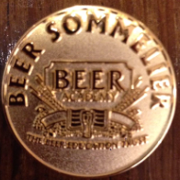
|
First published in BEER November 2007 as part of a piece about beers from Booths supermarkets. More Booths beers in previous post.
ABV: 5 per cent
Origin: Bedford, Bedfordshire, England
Website www.youngs.co.uk
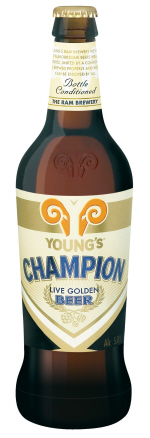 Wells & Young's Young's Champion Live Golden Ale Like many people I was sad to see Young’s quit Wandsworth but I’ve been impressed with the subsequent flavour matching at Bedford’s Eagle Brewery, including for the bottled specialities which had made the venerable ram trademark a brand to watch on supermarket shelves.
A case in point is Champion Live, a beer that, as a former Tesco Beer Challenge winner, actually owes its existence to another supermarket chain. Made simply from English lager malt and Styrian Goldings hops, this very drinkable rich golden beer with a good white head could be seen as a quality lager made with the techniques of a bottle conditioned ale.
A biscuity barley sugar aroma with hints of lemon squash, grapefruit, peaches and honey leads to a crisp but full malty palate that starts sweetish and turns tangy with a flinty edge. The detectable sour, slightly apply note is something of a house characteristic also found in the Young’s standard draught bitter, or “Ordinary”. A clean swallow leads to a dry mineral finish with chewy, slightly earthy hops and a very slight sulphur note. If not especially complex, this is a light-hearted, easy-going and very enjoyable beer.
For more Booths beers see next post.
Read more about this beer at ratebeer.com: http://www.ratebeer.com/beer/youngs-champion/25540/
First published November 2007 as part of a piece about beers stocked by Booths supermarkets.
ABV: 6.8 per cent
Origin: Rock, Cornwall, England
Website www.sharpsbrewery.co.uk
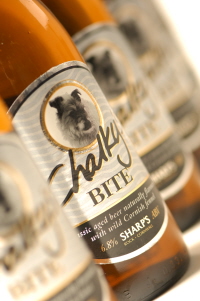 Sharp's Chalky's Bite If you’re a speciality bottled beer enthusiast, the chances are you’ll have heard of Booths Supermarkets even if you live a long way outside its Lancashire heartland. Under enthusiastic and knowledgeable beer buyer Dave Smith, this family-owned regional grocery chain has built a reputation for offering the best supermarket beer selection in Britain at prices that still meet and often beat those of the national giants.
Two years ago, CAMRA recognised Booths’ achievements by awarding it Best Retail Chain in the Real Ale in a Bottle Retailer awards. Earlier this year, industry colleagues concurred by naming it Multiple Beer Retailer of the Year in the Drinks Retailing Awards organised by trade publication Off License News. The judges spoke favourably of Booths’ ‘deep-rooted commitment to the beer category…not just using price promotions to drive sales but really adding value and excitement to their beer offering.’
The company now boasts almost 200 different British bottled ales plus imported specialities. Inevitably the majority are not Real Ale in a Bottle, but there’s a noticeably higher live yeast quotient than usual, and a good few hard-to-find lines – such as three bottle conditioned beers from Blackburn’s Three B’s (also selling locally through Threshers’ stores – see June’s Beer) and a newly added duo from 2007 Champion Beer of Britain medallist Wapping Brewery in Liverpool (see last month’s issue).
The selection reviewed below demonstrates the range of flavours on the current list, though note that none of the beers listed is exclusive – all are stocked by one or other national retailer. But you’ll be hard pressed to find them all in one place at bargain prices outside Booths’ 26 stores scattered between Keswick, Knutsford, Settle and Blackpool. And as the company’s online mail order wine business hasn’t yet been extended to beer, I for one am on the lookout for excuses for my next trip up the M6.
Sharp’s Chalky’s Bite has already enjoyed coverage elsewhere in Beer as a rare British attempt at a fine speciality beer to compete with Belgian imports on the dining table. It was created at award-winning Cornish micro Sharp’s by head brewer Stuart Howe at the behest of Padstow-based celebrity chef and seafood enthusiast Rick Stein, and named after Stein’s (subsequently deceased) Jack Russell terrier, who appears on the label.
Brewed from low colour Cornish Maris Otter barley malt, wheat malt and candy sugar, and hopped with Northdown for bitterness and Goldings for aroma, the beer is conditioned for two months at 0°C with Styrian Goldings and wild Cornish fennel seeds, then bottled with Belgian yeast and warm conditioned for a further two months before sale.
This elaborate recipe yields a rich glowing golden beer with a fine white head and a wheaty, spicy palate with subtle herb, citric and orange notes – I thought I smelt coriander but it’s not among the ingredients. The tangy palate, notably refreshing for such a strong beer, has unusual grassy mineral flavours and a certain sweetness dried by herbal and citric flavours.
Fennel registers subtly as the finish develops, alongside more mineral notes, finally quite peppery hops and sweetish fruit. This is an unusual and noteworthy beer, with obvious shades of a Belgian witbier but stronger, drier and more complex. It should go down a treat with seafood as intended but is also well worth sampling on its own.
More beers from Booths in next post.
Read more about this beer at ratebeer.com: http://www.ratebeer.com/beer/sharps-chalkys-bite/65068/
First published in BEER September 2007.
ABV: 4.9 per cent
Origin: Grafty Green, Kent
Website www.whitstablebrewery.info
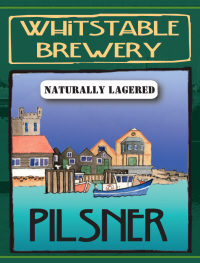 Whitstable Pilsner Whitstable, on the North Kent coast overlooking the lowest reaches of the Thames estuary, is synonymous with oyster fishing, and, since oyster eating is an activity where even fanatical oenophiles might consider beer when food matching, it was delightfully appropriate when some years back the town also gained an Oyster Stout to its name.
The stout originated at the Swale Brewery, originally in nearby Sittingbourne but eventually moving over the North Downs to the village of Grafty Green between Ashford and Maidstone. The brewery was bought and renamed in 2003 by the Whitstable Oyster Fishery Company, an old-established family concern that now owns the oyster beds, and at first supplied only the company’s own hotels and restaurants.
The new owners didn’t inherit the Swale recipes, so brewer Rafik Abidi developed his own version of Oyster Stout. This new stout is tasty enough, but better still is a craft-brewed pilsner-style beer, made from a pure malt mash of Fanfare lager malt with Czech Žatec hops added twice to the boil, cold fermented with a genuine lager yeast. The draught version is cask conditioned; the bottled version is lightly filtered but unpasteurised.
The slightly hazy golden beer pours with a fizz and a rapidly declining white head that brings to mind that other, more extravagant, natural partner for oysters, champagne. There’s an aroma of soft malt with slightly sharp orange, and a very biscuity and ice cream-soft palate turning bracingly hoppy with a citric tang.
The finish has full flavoured malt perfectly balanced with a squeeze of fresh lemon acidity and developing lightly bitter hops. And an elegant 33cl bottle with an attractive art nouveau label gives the beer the presentation it deserves.
Read more about this beer at ratebeer.com: http://www.ratebeer.com/beer/whitstable-bohemian-lager–pilsner/37797/
First published in BEER September 2007. Since then the brewery has taken over Cumbrian Legendary Ales at Hawkshead and relocated brewing to this site.
ABV: 4.3 per cent
Origin: Loweswater, Cumbria
Website www.kirkstile.com
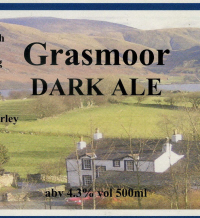 Loweswater Grasmoor Dark Ale Another local CAMRA award-winning small pub brewery [in addition to Farmer’s Ales, responsible for Golden Boar, reviewed in the previous post] is Loweswater, in the hamlet and close to the lake of the same name in the northwest corner of the Lake District national park, south of Cockermouth. Head brewer Matt Webster restored a brewery to the picturesque Kirkstile Inn in 2003 after a break of almost two centuries, with such success that this year they had to build an extension to the brewery buildings.
Real Ale in a Bottle has been added very recently and, as in Maldon, they bottle by hand – the brewery’s Roger Humphreys tells me he thinks they’re the only brewer in Cumbria bottling on site. At the moment two RAIBs are on offer – the brewery’s popular Kirkstile Gold and this dark delight.
Grasmoor Dark is a Maris Otter-based beer, with additional crystal and chocolate malts and Progress and Challenger hops. It’s a dark brown colour with a red tinge and pours with a creamy off-white head. Herbs and spices dominate a fruity aroma with a trace of roast, leading to a complex, quite dry palate with malted milk and roast notes and burry bitter hops emerging over smooth chocolate.
A very creamy swallow is followed by a bitter chocolate and roast almond finish with interestingly tangy herbal hops. Overall it’s a dark but not at all sweet beer that’s unusual and very tasty. Perhaps the local fells inspire a certain rugged grittiness – Grasmoor is the highest peak hereabouts and its name, continuing the porcine theme of the previous review, derives from the Old Norse for “wild boar”.
Read more about this beer at ratebeer.com: http://www.ratebeer.com/Ratings/Beer/Beer-Ratings.asp?BeerID=81643
First published in BEER September 2007.
ABV: 5 per cent
Origin: Maldon, Essex, England
Website www.maldonbrewing.co.uk
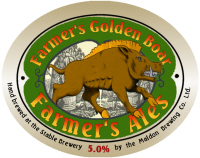 Farmer's Ales (Maldon) Golden Boar The Golden Boars were flying off the shelf at the Little Beer Shop just outside Norwich a couple of months back. While I nerdily checked my wants list I noticed two obviously regular customers back for repeat orders, and the manager couldn’t sing the beer’s praises too highly. So I squeezed in a bottle and was delighted to discover they weren’t wrong: this is a boar that lives up to its precious colour.
Farmer’s Ales, opened in 2002 and also known as the Maldon Brewery, is based in the stable block of the Blue Boar Hotel in Maldon, a pretty town on Essex’s Blackwater estuary, on the edge of Eastern England’s microbrewing hotbed.
Head brewer Charles Saville formerly worked at nearby Crouch Vale, and admits to the influence of that brewery’s seasonal Amarillo when devising Golden Boar as a cask ale for the Pig’s Ear Beer Festival in east London. But while the Crouch Vale brew uses eponymous Amarillo hops, the Boar uses “loads” of another North American variety, Cascade, alongside pale and amber malts. The brewery’s Chris Farmer says there’s a further ingredient but the brewers refuse to tell her what it is!
The Real Ale in a Bottle version is hand bottled and hand labelled at the brewery, and comes out a slightly hazy deep gold with a thick off-white head. Those “loads” of hops come over clearly in a flowery pineapple aroma – you can almost see the resin oozing out of a freshly squeezed cone.
The toasty, biscuity, creamy textured palate is bursting with bright and cheerful flavours: citric fruit, more flowers, rooty hops, fresh yeastiness and a detectable coloured malt note. The finish is equally flavourful and complex, with seedy peppery-bitter hops and herbal flavours over juicy sweet malt, and a not unpleasant whiff of burnt rubber.
As the choice of Real Ales in a Bottle from British craft brewers continues to expand, it sometimes seems difficult for new beers to make a distinctive and memorable impression. But every so often you’re awestruck by the fact that a simple combination of malt, hops and water can produce something so sublime, especially when virtually hand made in a pub shed. Golden Boar gave me one of those moments and is well worth grubbing up.
Read more about this beer at ratebeer.com: http://www.ratebeer.com/beer/farmers-ales-golden-boar/77026/
First published in BEER August 2007.
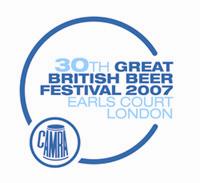 30th Great British Beer Festival 2007 Earl's Court London CAMRA The Great British Beer Festival is not only a huge celebration of indigenous real ale but also regularly presents one of the best showcases for international beer you could hope to find. The imported beer bars, collectively known as Bières sans frontières, are an attraction in themselves, with a significant minority passing up on the vast choice of British cask beers to sample an expertly chosen selection of the rest of the world’s finest.
You may be surprised to learn that the presence of “foreign” beers is almost as old as the GBBF itself, expanding from a single table with 15 beers in 1980 to today’s three large and prominent bars offering a choice of hundreds.
BSF has played a major role in educating drinkers about the beery riches to be found beyond these shores, whether it’s rare cask ales from the Pacific Northwest, unfiltered Franconian lagers or stouts from Sri Lanka. This year a wider selection than ever is promised: organiser Andy Benson and his enthusiastic volunteer crew are aiming to stock beers from 30 countries to mark GBBF’s 30th anniversary.
Andy gave me an advanced peek at the bottled beer list so I could pick out a mixed dozen to recommend you clank home with. This was at an early stage with many more beers to be confirmed and already it was a tough choice – the full list should be posted at www.b-s-f.org.uk by the time you read this so prepare to be further dazzled.
To whet the appetite, let’s start at the German and Czech bar with one of Germany’s finest and hoppiest pale lagers, Jever Pils (4.9 per cent). The brewery, in the German part of the ancient territory of Friesland, is now part of the giant Oetker group but the beer still impresses with its strong earthy hop aroma, lively bone dry palate and a finish that softens slightly with hints of vanilla and cream.
From the opposite end of Germany comes another established classic, Heller Aecht Schlenkerla Rauchbier Märzen (5.1 per cent), the benchmark smoked beer from the celebrated brewing city of Bamberg in Franconia. Deep chestnut with a thick yellowy head, this has a smoky bacon aroma, a dry but smooth and nutty palate and a marmalade finish with a whiff of smoke reminiscent of Islay malt whisky.
A must-have from the Dutch and Belgian bar is Schans Van Vollenhoven Extra Stout (7 per cent), a once-legendary Irish-inspired Amsterdam beer now lovingly revived. Van Vollenhoven’s “Gekroonde Valk” (Crowned Falcon) brewery was once the biggest in the Dutch capital, but was absorbed by Heineken in the 1940s and later closed.
For decades afterwards a version of the stout was brewed by cold fermentation at Heineken’s megabrewery in ‘s-Hertogenbosch but dwindling volumes saw it phased out in 2002. Then late last year, after much lobbying, Uithoorn micro De Schans launched a smooth, roasty and bitterish authentic warm fermented and bottle conditioned version under license, based on the rediscovered 1946 recipe.
Another outstanding Dutch beer is Christoffel Blond (5 per cent) from Roermond in Limburg, an unpasteurised and unfiltered lager in the pils style but so good its brewers have opted not to brand it with that much-devalued label. This world class peachy golden beer has light malt, chewy almonds and stern herby hops on the palate and a long complex finish with honeyed yeasty notes.
The long Belgian list includes beers from small micros hard to find even in their own country, such as Loterbol Bruin (8 per cent) from a small brewpub in Diest. This very dark brown bottled conditioned ale is brewed without candy sugar and thus drier than most Belgian strong browns, and very fruity with a chocolatey, slightly tart finish.
Also unusual by Belgian standards is the modest gravity of Dupont Biolégère – a mere 3.5 per cent. But this hazy blond unfiltered organic beer from a classic saison brewer in Tourpes is full of flavour, with slight farmyard notes on the aroma, and a crisp toasty citric palate with a good dose of hops.
BSF buyers can always be relied upon to find unusual and high quality Belgian fruit beers, avoiding the sickly sweet excesses of the more commercialised brands. From this year’s list I’d pick Girardin Framboise (5 per cent), a raspberry brew from a traditional lambic brewer near Brussels: it’s dry and tart but softer than some, and bursting with natural raspberry fruit.
Moving to the rest of the world, Brooklyn Black Chocolate Stout (10.6 per cent) is a modern classic imperial stout from New York. Created by celebrity brewer Garrett Oliver, this black and powerful brew overflows with complex flavours: coffee, marmite, red fruit, cocoa, liquorice and burry hops.
Another dark delight, Asahi Premium Black (Kuronama) (5 per cent), is an old-established Tokyo speciality inspired by German Schwarzbier. Dark burgundy with a slightly spicy aroma, it has a dry but luscious blackcurrant roast palate and milky coffee on a long, dry but soft finish.
Coopers Sparkling Ale (5.8 per cent) from Adelaide, Australia, is now much better known among beer lovers but still unique and surprising. This deliberately cloudy bottle conditioned beer smells of pineapple chunks and fresh baked biscuits, with a prickly sharp palate softened by honey and fruit and a rounded peppery citric hop finish.
Finally I’ll chance a beer I’ve not encountered before – like a Durban pale ale or pineapple beer from the Shongweni brewery of Natal, making its GBBF debut. For many years now, the BSF crew have been busy proving that there’s more to US beers than Anheuser-Busch and more to Dutch beers than Heineken – let’s hope they can now show there’s more to South African beers than SAB-Miller Castle Lager. I have every faith they will.
Bières sans frontières, Great British Beer Festival 2007. For more selections see previous post.
ABV: 5.7%
Origin: Polo Pony, KwaZulu Natal, South Africa
Website: www.shongwenibrewery.com
 The South African beer market is unsurprisingly almost exclusively dominated by homegrown global brewer SABMiller, but there is a scattering of micros and brewpubs, and the one that’s gained the most prominence internationally is Shongweni. It was founded in 2006 by Englishman Stuart Robson and his South African wife Sherene in the idyllic setting of the Valley of a Thousand Hills in the eastern province of KwaZulu Natal — “imagine the Lake District or Scottish lowlands, but in a subtropical setting,” as Stuart put it to beer writer Ben McFarland. The South African beer market is unsurprisingly almost exclusively dominated by homegrown global brewer SABMiller, but there is a scattering of micros and brewpubs, and the one that’s gained the most prominence internationally is Shongweni. It was founded in 2006 by Englishman Stuart Robson and his South African wife Sherene in the idyllic setting of the Valley of a Thousand Hills in the eastern province of KwaZulu Natal — “imagine the Lake District or Scottish lowlands, but in a subtropical setting,” as Stuart put it to beer writer Ben McFarland.
Durban Pale Ale is inspired by traditional British IPAs, to which there is some local claim as when these beers were exported to India the boats often stopped off in Durban and some of their cargo may have found its way ashore there. Brewed from South African malt and imported Cascade and Challenger hops (40 IBU worth), the beer comes out a cloudy light amber from bottle conditioning, with a fine creamy white head and a slightly vegetal orange and barley sugar aroma. A firm orange citric palate starts plain and then turns more complex with strawberrry fudge and caramel tones, thistly hops and slight farmyardy hints. It stays mainly dry through to a hoppy and herby but not especially bitter finish, with touches of roast, angelica and a nugget of coal tar soap. It’s an unusual and distinctive take on the style, if not yet a world beating one.
More Bières sans frontières selections in the next post.
Read more about this beer at ratebeer.com: http://www.ratebeer.com/beer/shongweni-robsons-durban-pale-ale/76872/
Bières sans frontières, Great British Beer Festival 2007. For more selections see previous post.
ABV: 5.8%
Origin: Regency Park, South Australia
Website: www.coopers.com.au
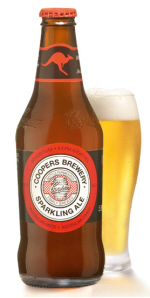 Coopers Sparkling Ale The survival of the Coopers brewery with its unique style of Adelaide sparkling ale amidst a tide of amber nectar you wouldn’t give a XXXX for, as recently as 2007 fighting off a hostile bid from Australasian giant Lion Nathan, has been widely discussed and celebrated by beer writers. So I won’t go into detail here about the history of this extraordinary beer, originated in 1862 by a recently-emigrated Yorkshire couple.
Made with pale and crystal malts and pelleted Pride of Ringwood hops and dosed in the bottle with unfermented wort and sugar to reawaken the unique house yeast, it’s a rich golden beer designed to be served cloudy. A subtle sweetish aroma has a pineapple chunk note with spice and fresh baked biscuits, followed by a prickly sharpish but mild, fresh and fruity palate that has light hops and building honeyed tones. The long finish turns drier with rounded pepper, honey and juicy lemon fruit, and a late resiny leafy hop note. A refreshing quencher with plenty of subtle interest to linger over if you care.
More Bières sans frontières selections in the next post.
Read more about this beer at ratebeer.com: http://www.ratebeer.com/beer/coopers-sparkling-ale/1589/
Bières sans frontières, Great British Beer Festival 2007. For more selections see previous post.
ABV: 5%
Origin: Sumida, Tōkyō, Japan
Website: www.asahibeer.co.jp
 Asahi Premium Black Kuronama The Japanese beer market exhibits a taste for dark lagers inherited no doubt from the German brewers who helped set up the country’s brewing industry in the late 19th century. Even so, this black beer from what’s now Japan’s biggest brewery, Asahi (“rising sun”), established as Osaka Brewing in 1889, is a recent addition — launched in 1995, it’s been seen as a brave departure for a brewer better known for its ultra-clean and pale lager Super Dry.
The beer acquires its dark burgundy colour and yellow-fawn head from three different roasted malts, although there are also rice and maize in the mash. A lightly malty-roasty aroma has hints of spice and sharpish fruit, and there’s a luscious but dry and roasty palate with blackcurrant and coffee notes. A milky coffee swallow sets up a drying roasty and slightly astringent finish with chocolate, burry hops and burned flavours over soft malt. Overall this is a beautifully balanced example of how to set off intense roast flavours with rich and tasty malts.
More Bières sans frontières selections in the next post.
Read more about this beer at ratebeer.com: http://www.ratebeer.com/beer/asahi-black-kuronama/6792/
Bières sans frontières, Great British Beer Festival 2007. For more selections see previous post.
ABV: 10.6%
Origin: Brooklyn, New York, USA
Website: www.brooklynbrewery.com
 Brooklyn Black Chocolate Stout The Brooklyn brewery, with its world famous and well travelled head brewer Garrett Oliver, needs little introduction — originally established to revive the pre-Prohibition style of quality lager as a contract brewery in 1985, it’s had its own plant in a former steel foundry since 1996 and has consistently turned out high quality beers inspired by a range of world styles. Black Chocolate Stout is one of its very best, a fine Imperial Stout made from three separate mashes with six malts including black and chocolate, bottle conditioned and capable of long ageing.
This black beer has a fine mid-brown head and a rich pastilley liquroice and roast aroma tinged with coffee and Marmite. The smooth, thick palate is meaty, spicy and tingling, with a definite roast espresso coffee note, though lacking in hard edges. Burry hops and fine cocoa spread across the tongue on a long and very powerful finish with notes of red fruit, ending sternly dry.
More Bières sans frontières selections in the next post.
Read more about this beer at ratebeer.com: http://www.ratebeer.com/beer/brooklyn-black-chocolate-stout/531/
|
Cask 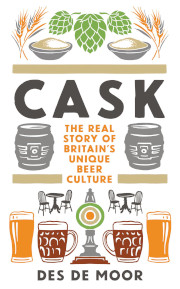 This pioneering new book explains what makes cask beer so special, and explores its past, present and future. Order now from CAMRA Books. Read more here. This pioneering new book explains what makes cask beer so special, and explores its past, present and future. Order now from CAMRA Books. Read more here.
London’s Best Beer 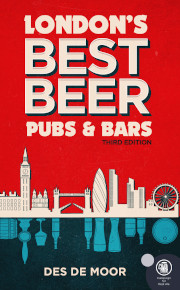 The fully updated 3rd edition of my essential award-winning guide to London’s vibrant beer scene is available now from CAMRA Books. Read more here. The fully updated 3rd edition of my essential award-winning guide to London’s vibrant beer scene is available now from CAMRA Books. Read more here.
|














